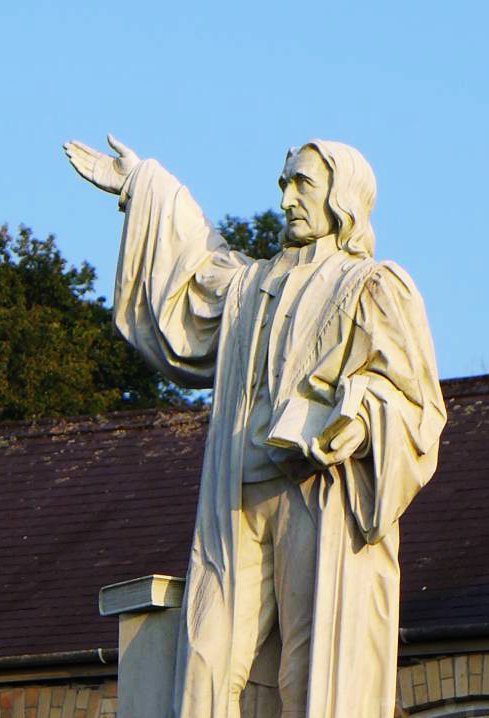
Our History
Pre-1927
Calvinistic Methodists
The origin of our church goes back to the eighteenth century Revival in Wales which God brought about through the conversions of men like Howell Harris, William Williams (who wrote over a 1,000 hymns) and Daniel Rowland. Four hundred fellowships of Christians were set up all over Wales which, for a while, remained part of the Church of England.
However, in 1823 there was the setting up of a separate church, the Calvinistic Methodist Church of Wales, based on their Confession of Faith (1823), and key developments, such as the building and staffing of a training college in Trevecca, and the financial support of the Countess of Huntington.
Statue of Daniel Rowland in Llangeitho, erected in 1883.
1927-1967
The Forward Movement
This new church had largely developed in Welsh speaking Wales and the predominantly English-speaking counties of Glamorganshire and Monmouthshire knew very little evangelical light. So members of the Calvinistic Methodist Church of Wales, John Pugh, Seth and Frank Joshua, undertook missions to industrialised areas of South Wales.
In Cardiff, for example, a meeting tent for preaching was set up in Splott which was the beginning of the Forward Movement, which saw over 60 churches established throughout Wales. In the Welsh capital, there was the building of the Heath, Saltmead, the Memorial Hall, Bethel in Caerau, Ely, and our own church, Mount Pleasant (1927) in Archer Road, Ely. Both Bethel and Mount Pleasant were built on land donated by a local English aristocrat, Lord Plymouth.
By 1954, the cause in Mount Pleasant was on the point of closure. However, Saltmead Forward Movement Church sent Mr Donald Hooper and Mrs Peggy Hooper to assist in the work of Mount Pleasant. God was in this and that to bless, and our cause began to grow under a dynamic, biblical ministry.
In May 1959 the congregation at Mount Pleasant called Mr. Donald Hooper to be its minister, following the completion of his training at Trevecca (see reference above). In 1961 he was ordained by the Presbyterian Church of Wales (the new name for the Calvinistic Methodist Church of Wales). The Reverend Hooper was also made responsible for the pastoral oversight of Bethel Presbyterian Church, Caerau.
John Pugh (1846 - 1907) planted more the 50 churches across Wales.
1968
Secession from the
Presbyterian Church of Wales
In a 31-page statement ‘Whether it be Right’ the leadership of Mount Pleasant Presbyterian Church outlined the history, reasons and aims relating to the withdrawal of Mount Pleasant and Bethel churches in Ely from the Presbyterian Church of Wales. The central issue was the dire effects of Liberal theology at every level in the Presbyterian Church of Wales, which teaching “ran contrary to the doctrines set forth in the 1823 Confession of Faith”.
1969-2022
The practical implications of our secession from the Presbyterian Church of Wales in 1968 were costly. We had to vacate both buildings and, for some years, endure all the considerable drawbacks of not having our own building to worship in. This meant that we met in various local schools for a period. God heard our cries, and by a very remarkable providence, we were enabled to purchase land on Michaelston Road and to build a new church on it.
Under the ministry of Reverend Donald Hooper, and several other gifted men, who joined our church, the cause at Michaelston Road grew. We were eventually enabled to buy back our building and land. Subsequently Mount Pleasant was re-named, finally adopting today’s name Ely Presbyterian Church (Reformed). The church grew so that by 1991 there were about 200 officers and members.
There were many highlights. In 1974 we established a church school entirely funded by ourselves and this is the case today. We enjoyed good fellowship and spent many camping holidays together. In order to more conveniently work out our love for one another, we moved to an area in or close to Michaelston Ely.
In 1978 we began to build our present House of God on the same site, adjacent to the existing church building, mainly using skills within our community. In 1980 the new redbrick building was consecrated and put into use, and the old church building was converted into the Church School.
In the late 1980s, the leadership of the church began considering the possibility of planting a mission church as the congregation had become too large for our premises. A need for a church was identified in the Culverhouse Cross area of Cardiff, and so a mission church, comprising a minister, three other elders, two deacons and their families, were sent out in 1991. After five years of God’s blessing, the mission church became Bethel Presbyterian Church. Immanuel Presbyterian Church, in Caerau, also has its roots in our church.
In 2016 the church became the Cardiff base for Greystone Theological Institute, which endeavours to nurture and deepen bonds with other faithful Christians in the riches of the confessional Reformed faith. Greystone Cardiff organizes regular book discussion groups, study days, seminars, and conferences, as well as occasional full Greystone modules.
Our current building was
consecrated in 1980.
2022 - present
Accession to the Evangelical Presbyterian Church in England and Wales (EPCEW)
Over half a century after leaving a Presbyterian denomination that had, in practice, largely abandoned its confession, in 2022 we celebrated becoming part of EPCEW, a denomination that is not only confessional, but confessing. The blessings of being united with sister congregations across the country, and farther afield, continue to strengthen us in many and varied ways. We thank God for guiding us into union with this denomination, which although young (established in 1991) is firmly rooted in our shared Reformed heritage, steeped in confessional, and so Biblical, doctrine and practice.
Our testimony is that over the many years of our history, all that has been done has only been accomplished in God’s strength, and it is to Him alone we give all the praise and glory. As we look to our future, we advance only in His Name, dependent upon His grace, love and enabling power, as we continue to serve Him joyfully in this community, following hard after Our Lord and Saviour, Jesus Christ.




